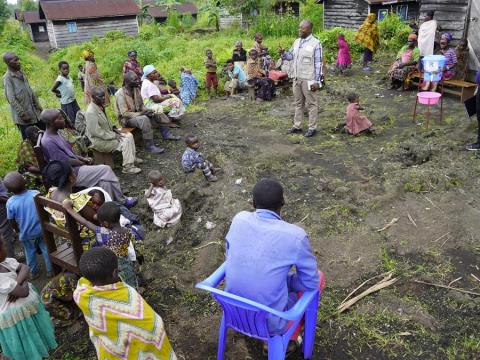
Think discovering a vaccine is the hardest part? Think again.
By Robert Kanwagi
How wonderful is it to start the year with new COVID-19 vaccines getting approvals every week? It means we can face this year with optimism that things are going to be different. But it also means for many of us, the hard part has just begun.
My work over the past six years on introducing an Ebola vaccine in Sierra Leone, Democratic Republic of Congo, Sierra Leone, Rwanda and Uganda gives me great hope that we can roll out COVID-19 vaccines around the world, in even the most difficult and dangerous places. After all we have already done it in places ravaged by conflict and insecurity, misinformation and rumour, and where the health, road and transport infrastructure and systems are often broken or creaking.
I have seen how vital it is that whole societies work together. Some of the best health systems in the world seem to be struggling right now to get the vaccine out to as many vulnerable people as possible. So, imagine what it is like doing this in an environment that is politically fragile, where armed conflict and insecurity are ever present, where there is poor or non-existent health infrastructure, and constant diseases outbreaks. I can tell you, it is possible – but only if every stakeholder is engaged, understands their role and contributes to achieving the shared goal.
As so many of us have said throughout 2020, COVID-19 is not the world’s first pandemic and it may not be the last. The challenge of our time is how we learn from the past, and use science to overcome this virus with a community-driven vaccine programme. There are five lessons I believe we need to heed.
- Where pandemics push people apart, vaccines can bring people together
COVID-19 has exposed divisions across the world on political fronts, but like one wise man said, death is the only true and equal democracy. I think this is why we have also seen epidemics bring political rivals together – in Sierra Leone during the Ebola outbreak, for example, the then-leader of the opposition worked with the incumbent president to get a unified message out to his supporters. - Size does not matter when it comes to partnership
When introducing vaccines, there are no small or big partners. All partners are equal, and all voices are essential, and all contribution is welcome. Those who accept the vaccine and those who oppose the vaccine are all important stakeholders in ultimate success. As I told my staff during the Ebola vaccine introduction, those who are oppose the vaccine are our strategic allies because they enable us to understand the unknown and engage better and more appropriately with the right messages. It is normal to face resistance during the introduction of any vaccine, what is not normal is how we respond and engage with those who hesitate to take the vaccine. We must challenge ourselves, and others, to engage in productive conversations. - Talk less, listen more
This is the magic bullet to increasing vaccine acceptance. It’s not how much we know about the vaccines, which is already publicly available information, but how much we are willing to listen and understand why the science and the greater public good and benefits are not appreciated by everyone in a community. The world now requires leaders at all levels, starting at the household, village and community level right through to Ministries of Health and Presidents and Prime Ministers, to intentionally listen and engage proactively in addressing community fears and concerns about prevention and control measures, and the vaccine introduction. - Misinformation flourishes in the absence of quality information
To educate people and build trust, we need to “flood the zone” and strategically improve the quality and speed of health communications through the creation of shareable content and emotional storytelling. There are psychological reasons why people are more susceptible to believing and spreading rumours and misinformation. Understanding, recognising and responding to those reasons will help address why people are vulnerable to misinformation – we can learn much from the social sciences about this. - Communities have their own solutions
A key factor in the fight against misinformation is community involvement. Investing in and building communities’ abilities to find and debunk misinformation, hold each other accountable and educate networks, both online and in-person, is so effective in increasing vaccine acceptance.
Perhaps the most important lesson I have learned, working with individuals, faith leaders, health workers and communities to ensure 130,000 people received a two-dose vaccine, is how much we all need compassion and empathy. It is understandable that people are scared and tired and frustrated. Telling them they’re wrong to be opposed to a vaccine doesn’t help; working with them to think critically about their sources of information is far more effective. As we begin this incredibly important journey to end this pandemic, these are lessons I found it useful to remind myself of – what are yours?
Robert Kanwagi is World Vision's programme coordinator for Ebola Vaccine Deployment, Acceptance and Compliance (EBODAC).